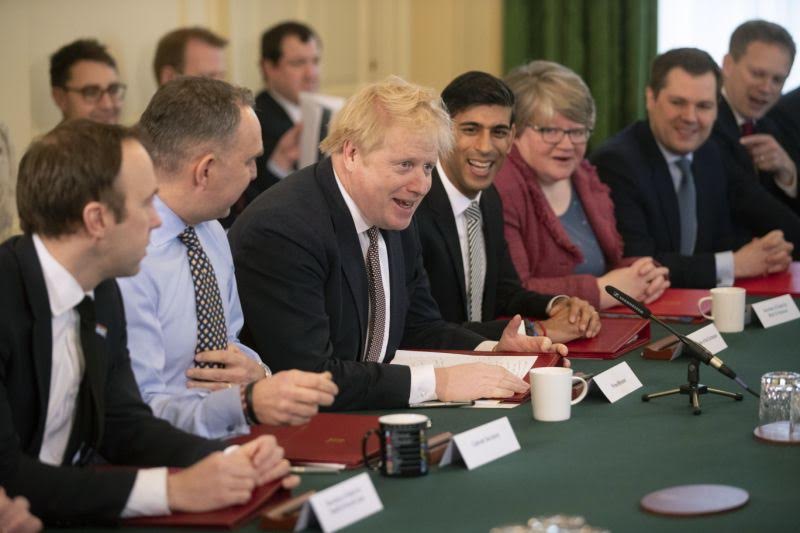IT WAS all about ‘The Saj’.
The shock departure of the former Chancellor from the government only a few weeks before his first Budget surprised media commentators and MPs alike.
The Chancellor of the Exchequer’s ‘did-he-fall/was-he-pushed’ resignation aside, the reshuffle was a return to the traditional way of Cabinet reshuffling Cabinet members. Out with the competent and argumentative and in with a collection of flunkies and stooges who owe everything to their loyalty to Brexit and Boris Johnson.
Julian Smith became Secretary of State for Northern Ireland in July last year. In his brief tenure in that role, he managed to re-establish the Northern Ireland Assembly and a cross-party power-sharing executive after three years of constitutional limbo during its suspension. That is the sort of signal achievement which usually leads to promotion. However, Mr Smith was an advocate of a ‘softer’ Brexit than proposed by Number Ten. He had gone so far to comment, in October last year, a no-deal Brexit would be “a very, very bad idea for Northern Ireland”.
Competent and with a record of achievement in his brief Cabinet tenure, he had to go.
His replacement is former Conservative Party Chair, Brandon Lewis. Ironically, one of the Conservative MPs who broke pairing arrangements at Mr Smith’s direction when the latter was Chief Whip.
The reaction to Julian Smith’s departure was a series of aghast tributes by all sides in Northern Ireland and Mr Lewis’ appointment greeted by the sort of ‘dangerous indifference’, Irish Taoiseach Leo Varadkar suggested was behind his predecessor’s sacking.
Mr Lewis is as loyal as a loyal thing. You tell him what to be loyal to and he’ll be loyal to it. Rather like a cushion, he bears the impression of the last backside to sit on him. He will lead the nodding dog tendency in Cabinet meetings.
The only tension in the Cabinet with him in it will be whether he or Health Secretary Matt Hancock gets the first Boris Bonio after meetings.
There weren’t only high profile departures, though. Liz Truss remains in place as Secretary of State for International Trade. No. Don’t laugh. Ms Truss’ presence at the Cabinet table is a sign of hope and a beacon to others. Her continued tenure in government is evidence that no matter how dimwitted, mediocre or out-of-their-depth a person is, this is a government of opportunity for all. Her presence shows senior backbenchers with talent, intelligence, and ability that their gifts are no substitute for those qualities’ total absence. To new Conservative MPs with room temperature IQs, her example shows that they, too, can aspire to Cabinet status.
The same might be said for Matt Hancock. The Health Secretary, who’s behaviour in the election campaign marked him out as a man to watch – preferably while he sat in a padded cell rocking to himself and murmuring the words ‘forty new hospitals’ over and over – is the only person in the country to take what the Prime Minister says at face value. The incredibly credulous Hancock has chained himself to the wheel of misfortune and will spin every disaster into a triumph with puppy-like devotion. Like a whipped dog will try to make friends with its tormentor, Matt’s loyalty is endless.
The departure of Andrea Leadsom demonstrates that even Boris Johnson thinks a joke can be taken too far. Floundering in every position she ever occupied, it is difficult to conceive that she could have been the leader of her party, and subsequently PM, barely three years ago, Ms Leadsom’s legendarily argumentative nature ushered her to the Cabinet door.
Her replacement at the Department of Business, Energy, Investment and Skills (BEIS) is Ashok Sharma. Mr Sharma’s appointment is interesting. He might be dangerously half as clever as Boris Johnson thinks he is, which means he could run rings round the PM. His ability was rewarded in a particularly cunning way. Accepting a role turned down by a former PM and a former Foreign Secretary, Mr Sharma will coordinate and chair the government’s preparations for the next round of climate change talks, due to take place in Glasgow later this year.
If the conference achieves anything, highly unlikely as the US, China and India will stall any possible progress, the praise will be the government’s and therefore Boris Johnson’s. Like the Sun King, Boris is not only a state but the state. If it all goes the well-known shape of a pear, Mr Sharma gets to take the fall. Rewarding ability with a poisoned chalice: that’s the way of government these days.
Theresa Villiers’ departure from DEFRA and her replacement with George Eustice received a cautious but warm welcome from farming unions and rural organisations. Ms Villiers’ naked enthusiasm for the benefits of free trade and blindness to the consequences of it for UK agriculture did little to instil farmer with any confidence in her to do what was best for the industry. From a farming background himself, Mr Eustice is far better placed to sell any betrayal to those farmers who, free of the EU as they wished, find their businesses going down the pan if/when imports of lower quality and lower price undercut them after December 31 this year.
The Department of Culture Media and Sport (Don’t Care Much, Seriously) has a new Secretary of State in Oliver Dowden. Mr Dowden replaces Nicky Morgan, a minister you couldn’t possibly describe as two-faced as she wouldn’t wear the one she does if she was.
Mr Dowden’s main ministerial achievement in a brief parliamentary career was his replacement by Jonny (‘Did I mention I was in the Army?’) Mercer as a junior flunky in the Cabinet Office. His task is to put into place the Government’s policy of neutering the BBC and trashing public service broadcasting. A PR man before entering parliament and – as a special advisor to David Cameron – a PR man for a PR man, Mr Dowden will have to sell the Government’s plans to dismember the BBC to the public and MPs.
The appointment that caused most comment and concern was Suella Braverman’s promotion to replace Geoffrey Cox QC as Attorney General. Brexiteers hailed Mr Cox’s independence of mind and judgement when he declined to rubber-stamp Theresa May’s proposals for an Irish Backstop as part of her doomed attempts to force a Withdrawal Agreement through Parliament. He also loudly – he doesn’t do quietly – laid into the High Court’s decision that Mr Johnson’s prorogation of Parliament was unlawful. However, Mr Cox is also a person with a deep and abiding respect for the rule of law and the need for courts to act as a check and balance on poorly-made and ill-considered legislation. The growth of Judicial Reviews of governments’ laws can be partly laid at the door of those who prepare legislative measures in haste and then repent at leisure as the Court’s painstakingly explain why they are unenforceable or unlawful. Whatever his flaws as a Government minister, Geoffrey Cox is a proper lawyer with a keen understanding that bad laws and incompetently-prepared legislation are properly subjected to scrutiny by the Courts.
Suella Braverman has no such scruples. An advocate of increasing political vetting of judicial appointments, she also has no evident skills as either an advocate for sound law and sound law-making.
The role of the Attorney General is to advise the government, as impartially as possible in the circumstances, on a range of legal issues arising from its planned legislative programme. Ms Braverman’s appointment is a sign that what Boris Johnson wants most from his law officers is a nodding-dog approach, a readiness to sign-off on any crackpot plan, and knifing the Courts for doing their job properly in a plural democracy in which an overmighty executive needs curbing.
The most rabid of Brexiteers and an appalling media performer whose backside she often confuses with her humerus, Suella Braveman cannot be relied upon to do what’s right but can be relied upon to do what Boris Johnson tells her is right. Otherwise, her main qualification for her new role seems to be the gift of forgetting that she studied at the Sorbonne under the Erasmus programme and had her post-graduate studies in Paris funded by the French embassy. In other words, precisely the sort of exposure to continental education and cultural enrichment this Government is dedicated to ending.
And finally, we come to the new Chancellor. Rishi Sunak’s rise to power is proof that enormous personal wealth, a background as a merchant banker and having a job working for his indescribably wealthy father-in-law. All that might be unfair to Mr Sunak; however, replacing state-educated Sajid Javid with a privileged alumnus of Winchester could be easily interpreted as an attempt to broaden the government’s appeal to distressed billionaires.
Mr Javid’s loaded remarks around the circumstances of his dismissal, ‘no self-respecting minister would continue to serve’ (if ordered to sack his entire team of ministerial advisors) suggests Mr Sunak’s self-respect is in inverse proportion to his self-regard. It is also a sign that Mr Johnson has restored the long-forgotten tradition of the Exchequer as a money chest at the beck-and-call of a prime-ministerial whim. Mr Sunak’s one advantage is that he can scarcely be sacked after the manner of his predecessor’s leaving. At least for as long as he does what he’s told.
The cringe-worthy sight of Mr Johnson’s new Cabinet at its first meeting playing call and response with the class bully suggests that Boris Johnson now has a team he wants. More-or-less malleable office-holders who will do as they are told. Taking back control, it turns out, means an uncontrollable PM.
Johnson’s reshuffle throws up jokers














